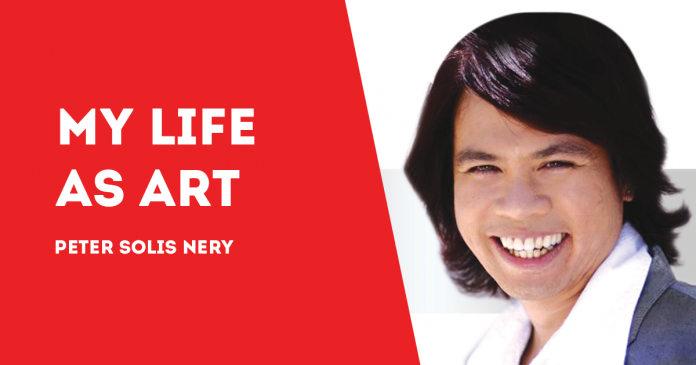
SERAFIN I. Plotria, Jr. is an award-winning broadcaster in Bacolod City, who also teaches communication, media, and languages at the University of Negros Occidental – Recoletos. Author of a children’s book, he was also the grand prize winner of the 2018 Peter’s Prize for Poetry.
*
Hell Is Real When It’s Upon Us
A reading of Peter Solis Nery’s “The Creation of Hell”
by Serafin I. Plotria, Jr.
*
“The Creation of Hell” by Peter Solis Nery is a poem that is more of a social commentary directed at the whole of society than just an attack at those in power or in the position to exploit the helpless. Here, the hell referred by Nery in the title connotes a state or condition created by both social extremes: those who took an oath to lead — and failed; and those who agreed to be governed — and be betrayed. The interconnectedness summed up in the opening line may be used as a closing statement as well as it similarly bears the same truth that the poem is unraveling.
In lines 2 and 3, the ‘interconnectedness’ of the greed, covetousness, rapacity, and the selfish fear of falling from power of those in the upper echelon of the social pyramid goes neck to neck with the acceptance of injustices, lawlessness, and becoming boldly indifferent of those abused at the bottom end of the social food chain. The powerful feast on the weaknesses of the powerless, as lines 5 and 6 emphasized.
In this poem, Nery deliberately avoided using complex figurative language in describing details of human conditions suffered by both extremes of the social strata; as such, social ills need no sugarcoating, no more play of language, but explicit and straight-forward treatment. It appears that the objective here is not to tickle the reader’s imagination as there is nothing entertaining about the condition pointed out by the poet.
Lines 7 down to 17 presented a chronology of innocence and good intentions swallowed by greed and selfishness. The wasted opportunity that comes along with power transformed into a new hunger of corrupt appetite to hold on to the same power, no matter what. It can be noticed that Nery is sublimely suggesting how such power changes one’s good heart, and mutates the person from his original honorable intentions into drunkenness with the drive to remain in power. Here, the foundation of the ‘hell’ Nery is warning the readers about begins to take shape.
As in a cause and effect pattern, lines 18 and 19 give us the same route, but are used here as a transition towards the succeeding lines 20 down to 23 which made a dramatic switch from the previous straight-forward use of language. “Until everything around us is numbing red” is like a clever use of silence in film to either transition or heighten an important element of the movie. The word ‘numbing’ effectively creates the ringing silence!
The poetic play with words Nery is known for in his other works starts to be noticed here. The symbolism in repeating the use of the color red in lines 20 to 23 is unmistakably done to entice readers to visualize the new reality the society is soaked in, and is witnessing, as the flurry of greed, selfishness, and apathy leading to violence and death becomes commonplace — even in the broad noonday sun. The red as a color of profound representations is obviously a brilliant choice in creating the image of greater ferocity tantamount to a hellish experience.
Painting both sky and earth red is bringing readers into a helpless situation where looking beyond becomes a desperate attempt to find hope somewhere else. But wait, there’s more — even the trees on the horizon are covered in red, too! Now, where do we go from here? It’s hell, hell, hell!
Line 22 brings the whole poem closer to the heart: “And where our family and friends lay dead is red” suggests a final straw that ultimately pulls the trigger, forcing the readers to consider the whole thesis of the poem in a personal level. Here, the poet is attempting to bring the distant social cancer that gradually eats up the moral fiber of the society closer to the lenses of the readers. The attitude that we do not feel it until one of us is hit is being challenged.
But the ideal response the poem is hoping for is suddenly jarred by line 23’s “We see only red, we watch as if not part of any of it” to reintroduce the grave reality of the present condition. The whole of humanity is beginning to feel emotionally numb with all the violence and atrocities perpetuated by, and from, both poles of the social extremes. This numbness to society’s pain opens the floodgate of hell initiated by the corrupt few.
Nery ends the poem in lines 24 and 25 with an attempt to puncture the collective conscience of the society with the accusatory statements “We accept these injustices and lawlessness” and “And we become boldly indifferent.” As if the poet is challenging and waiting to see if the society he is talking to will move to action and change their ways, or continue to look on apathetically as hell is being created amidst them, and by them./PN

